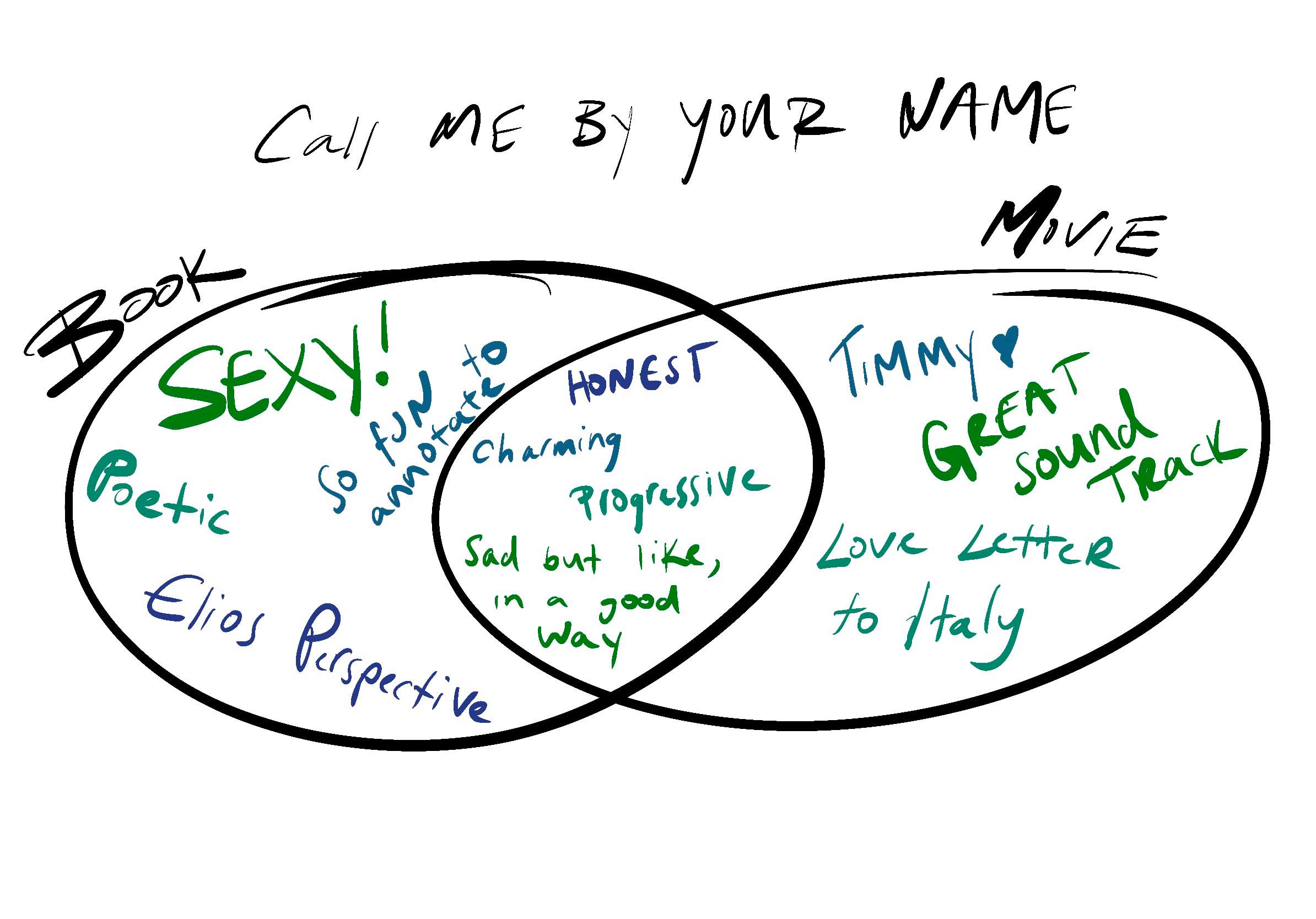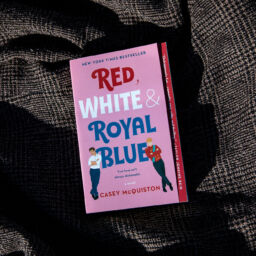When I first watched Call Me by Your Name, I couldn’t help but think that the film was a little anticlimactic. Sure, there were highlights, obviously the main being Timothee Chalamet, but I couldn’t help but believe that the book would have to be better. Much to my surprise, the film is a fairly accurate representation of the novel. There are some differences, some trivial (Oliver eats the peach!) and some major (Oliver and Elio reconcile decades after their summer of romance.)
For those unaware, Call Me by Your Name is a gay romance novel written by Andre Aciman that was published in 2007. The book was later adapted into a film by Luca Guadagnino starring Timothee Chalamet and Armie Hammer. Below I have artfully displayed the pros of reading the novel versus watching the film and where they coincide via Venn diagram- further details elaborating is below.
Reason #1 to watch the film: Timothee Chalamet is one of the finest young actors to date. As I write this in 2022, Timothee has become one of the most household names in entertainment by sheer work ethic, he starred in 4 different major productions just last year. He’s worked with some of the greatest directors of our generation and basically anything he stars in is guaranteed to be successful. Call Me by Your Name was such a beautiful kick off to career because of the intensity he brings. He’s proving himself in every scene, he plays piano, he’s speaking three different languages, he’s expressing extreme vulnerability and a huge range of human emotions with little to no dialogue.
Reason #2 to watch the film: it’s fucking gorgeous. Luca Guadagnino obviously is an incredible and daring filmmaker (you have to be ballsy to recreate and amplify a masterpiece like Susperia) but he managed to create a beautiful film with little to no gloss. The film itself feels like a documentary, there is no heavy filtering or costuming, everything about it is genuine. Luca wrote a love letter to Italy through Elios eyes.
Reason #1 to read the book: Elio. Much like the film, the greatest part of the book is Elio. Within the story, as a reader you get too close to Elio with the level of vulnerability that the author is projecting. The authenticity of his character is written through his soliloquy, a constant and unbearable monologue happening within Elio as he digs himself deeper and deeper into his own mind. The main difference between the film and the book is that we don’t have accessibility to Elios inner monologue in the film, which essentially creates a completely different story. Elio has created more than half of his relationship with Oliver in his head, while he lectures on and on about his fantasies about Oliver, as the story progresses, we learn about his shame and his fear. The inner dialogue is absolutely the most beautiful part about the book, full of metaphor and poetry.
Reason #2 to read the book: The story is sexy while the language is poetic. 97% of the novel takes place in the brain of a seventeen-year-old boy and his thoughts know no bounds. The sexiest parts of the novel aren’t even the sex scenes, it’s Elio’s fantasies and feelings leading up to them. The author heats you from the base of the spine, pulling upwards and finishing with an inescapable blush. Erotic is the only way to describe the entire first half of the book.

Both novels have such delicious, lyrical language to be tattooed, referenced, highlighted and rewritten in a million different ways, the plot itself just loosely guiding us to that next piece of wastefully extravagant poetry.
Why both matter: A subtle reminder that this narrative takes place in the 80’s. Simultaneously in Italy, where gay marriage is still illegal. In yet, this story is tragic because who you love when you’re seventeen is rarely who you end up with, despite that love having the capability to consume you for the duration of your life.
The greatest dialogue in both the film and the book comes from Elio’s father where he states “We rip out so much of ourselves to be cured of things faster than we should that we go bankrupt by the age of thirty and have less to offer each time we start with someone new. But to feel nothing so as not to feel anything- what a waste!” This story resonates with some many people because whether you’re gay or straight, your first love is terrifying and all consuming. Call Me by Your name is a tragedy because the love is lost, but it’s an anthem as well. It’s a gay romance novel with no hate crimes, no one contracting HIV/AID’s or being disowned by their parents. It’s an emblem of hope for literature, and while a series of sexual encounters doesn’t exactly resemble a plot, these experiences tied together is more that of extremely narrative poetry.
Realistically, I would only recommend this book to someone with a great attention span. Because Elio’s inner monologue is so relentless, I’d suggest just watching the film unless you want to go on a treasure hunt for the hidden poetry within the novel. If you’re someone that needs a lot of plot or character development, this read will not satisfy you. The writing is repetitive and heavily metaphorical, although extremely fun to annotate. Within the last chapter, Elio compares his experience with Oliver to Catherine and Heathcliff from Emily Brontë’s classic novel, Wuthering Heights by reference: “He’s more myself than I am.” This contrast between novels is so relevant, both being so anticlimactic and difficult to read, yet inarguably important. Both novels have such delicious, lyrical language to be tattooed, referenced, highlighted and rewritten in a million different ways, the plot itself just loosely guiding us to that next piece of wastefully extravagant poetry.









